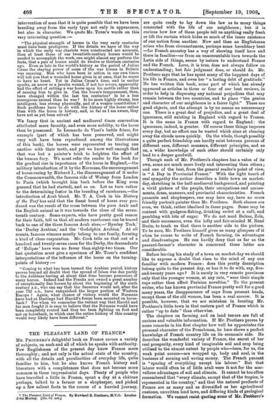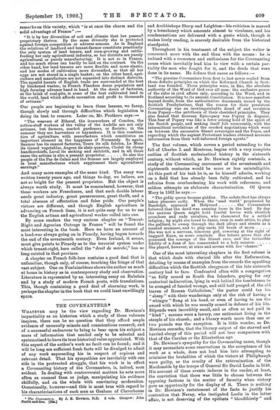THE PLEASANT LAND OF FRANCE.• MR. PROTHERO'S delightful book on
France covers a variety of subjects, on each and all of which he speaks with authority. Few Englishmen of the present day know France more thoroughly ; and not only is the actual state of the country, with all the details and peculiarities of everyday life, quite familiar to him, but he also knows French history and literature with a completeness that does not become more common in these impressionist days. Plenty of people who have travelled a little in France, spent a day at a chateau perhaps, talked to a farmer or a shopkeeper, and picked up a few salient facts in the course of a hurried journey,
* The Pleasant Land of France, By Rowland E. Prothero, M.V.O. London _John Murray. [108. 6d. net.]
are quite ready to lay down the law as to many things connected with the life of our neighbours ; but it is curious how few of these people tell us anything really fresh or lift the curtain which hides so much of the inner existence of one nation from another. Now and then an Englishman arises who from circumstances, perhaps some hereditary bent —for French ancestry has a way of showing itself here and there in families—or from an unaccountable turn towards the Latin side of things, seems by nature to understand France and the French. Love, it is true, does not always follow on understanding; but fair judgment does, or should do. Mr. Prothero says that he has spent many of the happiest days of his life in France, and owes her " a lasting debt of gratitude." He has written this book, some part of which has already appeared as articles in three or four of our best reviews, in order to help in dispersing any national prejudices that may remain between the two countries, and to place "the genius and character of our neighbours in a fairer light." These are good objects, and the attempt is by no means an unnecessary one. There is a great deal of prejudice, and a great deal of ignorance, still existing in England with regard to France.
It is the same in France with regard to England : the ignorance, indeed, is greater. Of course these things improve every day, but no effort can be wasted which aims at clearing away the clouds more quickly. On the whole, though possibly a quite perfect friendship can hardly exist between persons of different race, different manners, different principles, and so on, a wider knowledge of each other should certainly only lead to a deeper goodwill.
Though each of Mr. Prothero's chapters has a value of its own, some are much more lively and interesting than others; and one of the best, from the general reader's point of view, is " A Day in Provincial France." With the light touch of real sympathy the author describes a little town on market- day, sketching in the half-mediaeval background, and painting a vivid picture of the people, their occupations and amuse- ments, dress, manners, and provincial characteristics. French peasants and shopkeepers, one may here say, have no more friendly portrait-painter than Mr. Prothero. Both classes are even, we think, rather idealised in these pages. Some may be
content with gudgeon-fishing, drinking sorbet at a café, and gambling with bits of sugar. We do not need Balzac, Zola, and their successors, even the lofty and fair-minded M. Rene
Bazin, to teach us that there is another side to the picture.
To be sure, Mr. Prothero himself gives us many glimpses of it when he comes to write of French farming, its advantages and disadvantages. He can hardly deny that as far as the peasant-farmer's character is concerned these latter are considerable.
Before leaving his study of a town on market-day we should like to express a doubt that rises to the mind of any one familiar with modern France : does this pretty description belong quite to the present day, or has it to do with, say, five- and-twenty years ago ? It is surely in very remote provinces only that the younger women, at any rate, "wear their simple caps rather than affect Parisian novelties." To the present
writer, who has known provincial France pretty well for a good many years, the disappearance of caps from peasant heads, except those of the old women, has been a real sorrow. It is possible, however, that we are mistaken in locating Mr. Prothero's little town in that eastern part of France which is rather " up to date " than otherwise.
The chapters on farming and on land tenure are full of curious and valuable information. If Mr. Prothero proves by some remarks in his first chapter how well he appreciates the personal character of the Frenchman, he here shows a perfect knowledge of French country life on its economic side. He describes the wonderful variety of France, the secret of her real prosperity, every kind of imaginable soil and crop being utilised to the utmost extent by people who—here, for us, the weak point occurs—are wrapped up, body and soul, in the business of earning and saving money. The French peasant is "sparing of everything except his labour." But that labour would often be of little avail were it not for the mar- vellous advantages of soil and climate. It cannot be too often remembered that "every climate, except that of the tropics, is represented in the country," and that the natural products of France are as many and as diversified as her agricultural customs, unwritten land laws, and differing kinds of geological formation. We cannot resist quoting some of Mr. Prothero's
remarks on this variety, which "is at once the charm and the solid advantage of France" "It is by her diversities of soil and climate that her peasant proprietary thrives. By the same diversity she is protected against foreign competition or adverse seasons. As in England the relations of landlord and tenant-farmer constitute practically the only system of land tenure, and corn-growing and cattle- feeding her only agricultural industry, so her districts are purely agricultural or purely manufacturing. It is not so in France, and too much stress can hardly be laid on the contrast. On the other hand, her land tenures are more flexible and more elastic, and her modes of cultivation more diversified, so that all her eggs are not stored in a single basket; on the other hand, agri- culture and manufacture are not separated into distinct districts. The squalid haunts of English trade are surrounded at the best by blackened wastes; in French Flanders dense population and high farming advance hand in hand. At the doors of factories, at the brink of coal-pits, is some of the best cultivated land in the world, land which affords recreation and profit to thousands of artisans."
Our people are beginning to learn these lessons, we fancy, though slowly and through difficulties which legislation is doing its best to remove. Later on, Mr. Prothero says :— "The weavers of Elbceuf, the ironworkers of Conches, the cotton-stuff workers of the valley of the Audelle are not only artisans, but farmers, market gardeners, or florists ; in the summer they are harvesters or haymakers. It is this combina- tion of agriculture with manufacture which constitutes an important element in the happiness of Normandy. So again, Saumur has its enamel factories, Tours its silk fabrics, Le Mans its tinned vegetables, Angers its slate quarries, Cholet its cheap handkerchiefs, Laval its sacking and sailcloth, and in all these cases the artisan is also a peasant proprietor So also the people of the Pas de Calais and the Somme are largely employed in local manufactures which supplement their agricultural earnings."
And many more examples of the same kind. The essay was written twenty years ago, and things to-day, we believe, are not so bright for the peasant proprietor. But the object is always worth study. It must be remembered, however, that these workers are Frenchmen, and that such double labour needs great industry, great perseverance, great thrift, and a total absence of affectation and false pride. Our people's virtues are different, and though English agriculture is advancing on French lines, it is not quite easy for us to see the English artisan and agricultural worker rolled into one.
By some readers the very curious chapter on "Tenant- Right and Agrarian Outrage in France" will be found the most interesting in the book. Here we have an account of a land-war always going on in Picardy, having begun towards the end of the seventeenth century. Even Ireland, it seems, must give points to Picardy as to the terrorist system under which tenant-right, here called the "drat de marehg," has so long existed in that province.
. A chapter on French folk-lore contains a good deal that is unfamiliar, though only, of course, touching the fringe of that vast subject. One on Fontainebleau shows the author as much at home in history as in contemporary study and observation. Literature is represented by an interesting essay on Rabelais and by a study of modern French poets, with translations. This, though containing a good deal of charming work, is perhaps the chapter in the book that we could least unwillingly
*Pam











































 Previous page
Previous page